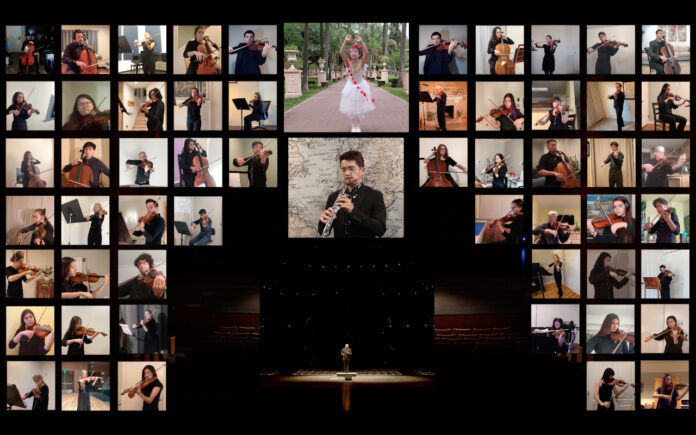Music director, professor and cellist detail elements of performance that are lost online and hopes of returning to live performance
By LYRA FARRELL — features@theaggie.org
In normal years, the UC Davis Symphony Orchestra (UCDSO) would gather in the Mondavi Center in front of a large audience for a live performance during Fall Quarter. This past year, however, performance has taken on a completely different form as each musician recorded themselves playing from home and submitted their audio tracks to be edited together. In fall 2020, the UCDSO put together a virtual performance in collaboration with an opera singer, in which each orchestra member can be seen playing their instrument in individual boxes.
Jacob Bleha, a third-year biological sciences major who has played the cello for the UCDSO since his freshman year, spoke about the making of the virtual concert.
“It was weird listening to a recording and playing along with that rather than playing with a whole group because you don’t feel the vibrations of the music; you don’t communicate with each other; you don’t look at the conductor; you don’t move as a group,” Bleha said. “You play along with their recording, and that was a lot more difficult.”
While members of the orchestra played their instruments from home, Christian Baldini, the director of the UCDSO, made the decision to record himself conducting from an empty Mondavi Center to emphasize the element missing from the performance: the audience.
“I think we wanted to portray this absence,” Baldini said. “As an audience member, I desperately need to experience live music, to go to concerts. From the performance perspective, […] it’s not the same if we’re doing it to an empty house, so that’s kind of the message we wanted to send out, this melancholy of, ‘We are doing a part of what we normally do and we are definitely missing the other part, which is you.’”
Laurie San Martin, a UC Davis professor and the chair of music, has composed pieces for the UCDSO and discovered certain barriers in teaching music remotely that don’t exist for other subjects.
“There’s lots of things that have been difficult [to teach], but music theory has had the hardest time translating [to online], I think, because of the […] mechanics of the music,” San Martin said. “It’s really not the same if you connect it to hearing it, playing it, singing it, being in the same space.”
Because the remote orchestra classes Baldini taught in Spring Quarter of 2020 and Winter Quarter of 2021 couldn’t rehearse in person, he used the course time to promote a greater understanding of inclusivity in the world of orchestral music by inviting various composers and musicians from different backgrounds to speak.
“It was a very large written seminar, essentially,” Baldini said. “This is a really important mission, not to just perform the music that, maybe you fell in love with because of Beethoven […], but there’s another side: [for example], why are female composers not represented, why are African American composers neglected on the concert platform?”
Baldini says that the orchestra’s return to in-person performances this Fall Quarter of 2021 is looking likely.
“Our goal and our plan is to return with a full orchestra,” Baldini said. “We don’t really know what the situation is going to be, whether public officials will say, ‘You can only have this much audience capacity,’ or not, but the most important thing is that it looks more and more likely since the vaccination rates are so high and the positivity rates for [COVID-19] are so low.”
Although Bleha admits that he and his peers have had a different relationship with their instruments without rehearsal of any kind over the past year, he doesn’t think it’ll take long for the orchestra to get back to their original sound once they resume rehearsing together.
“I think it’ll come naturally, it’ll come smoothly for all of us, we’ll get into the swing of things again, and it’ll go back to normal soon enough,” Bleha said.
San Martin has recently been able to oversee the return of in-person performance for small UC Davis ensembles. In her experience, an irreplaceable component of live music is the physical sensations one can feel around them in the room.
“Feeling the music is […] one of the things that makes live performance so much richer—it’s not just our ears that are listening; it’s the vibrations and our whole body feeling this, so it’s an amazing thing to be back in the concert hall,” San Martin said.
Written by: Lyra Farrell — features@theaggie.org




